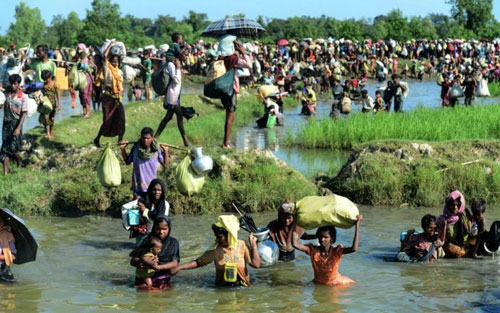Dhaka
Bangladesh and Myanmar have agreed to start repatriating Rohingya refugees in the second quarter of 2021, more than three years after some 740,000 people fled to Bangladeshi refugee camps to escape a brutal military-led ethnic cleansing campaign in their home in Rakhine state.
However, at a virtual meeting on Tuesday, chaired by Chinese Vice Foreign Minister Luo Zhaohui, and the first such negotiation since last January, Myanmar shot down Dhaka’s plan to start sending refugees home earlier.
“We had proposed starting the repatriation in the first quarter, but Myanmar said logistical arrangement will take some more time. So, we said we can do it in the second quarter. They agreed to it,” AK Abdul Momen, Bangladesh’s foreign affairs minister told reporters.
He said China and Myanmar had accepted Dhaka’s proposal of allowing international observers, but added that Myanmar would only start off with 42,000 out of 830,000 refugees who had already been biometrically verified by Bangladesh, reported the local Daily Star.
The tentative deal leaves unanswered questions about rights and security guarantees for the Rohingya, although Mr Momen said he had stressed the need to create the right conditions to ensure “voluntary repatriation.”
Two previous attempts in 2018 and 2019 collapsed over refugees’ safety fears. A statement about the meeting issued by Naypyidaw claimed that “Myanmar has made all necessary arrangements for the repatriation” reported Radio Free Asia.
The two sides agreed to hold a follow-up meeting in first week of February. China continues to insist the issue is “bilateral,” demanding the international community refrain from “further complicating the situation.”
However, Bangladesh has stressed it needs international help to find a lasting solution. In exclusive comments to The Telegraph ahead of Tuesday’s meeting, Mr Momen expressed frustration not only at foot-dragging by Myanmar which had “the moral and legal responsibility to end this crisis” but also at the United Nations and wider international community.
“We are trying hard bilaterally, trilaterally and even multilaterally to end the plight of these persecuted people. We approached the UN also but except lip service and tall talks, none could ameliorate the plight of Rohingyas,” he said.
Mr Momen urged rights groups and the UN to dedicate more efforts to “convincing Myanmar to create a conducive environment inside Rakhine province” where the Rohingya had lived for centuries.
“Their focus should be to help rehabilitate them and achieve a decent and secure life in their own country,” he said. “It is unfortunate that although Myanmar is violating human rights and engaged in ethnic cleansing, many countries instead of sanctioning and stopping business and investment in Myanmar, in fact, increased it.—AFP










